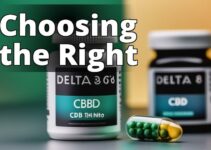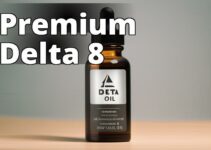What readers will learn:
- What Delta-8-THC is and how it differs from other cannabinoids like Delta-9-THC and CBD
- Anecdotal evidence and consumer experiences of using Delta-8-THC for anxiety disorders
- Potential mechanisms of action and the limited scientific research on Delta-8-THC for anxiety disorders
Can Delta 8 THC be an effective treatment for anxiety disorders? Anxiety disorders affect millions of people worldwide, causing significant distress and impairing daily functioning. While traditional medications and therapies are commonly used, there is growing interest in alternative remedies, including Delta-8-THC, a cannabis-derived product. This article explores the potential of Delta-8-THC as a treatment option for anxiety disorders, examining its effects, safety, and current scientific research.
Understanding Delta-8-THC
Delta-8-THC, or Delta-8-tetrahydrocannabinol, is a naturally occurring cannabinoid found in cannabis and hemp plants. It is similar to Delta-9-THC, the primary psychoactive component of cannabis, but has milder effects. Delta-8-THC is known for its potential therapeutic effects, including reducing anxiety.
Anecdotal Evidence and Consumer Experiences
Anecdotal evidence and consumer experiences play a significant role in understanding the potential benefits of Delta-8-THC for anxiety disorders. Many individuals have reported using Delta-8-THC to alleviate anxiety symptoms, with surveys indicating that about 69% of participants reported using Delta-8-THC primarily for anxiety or panic attacks[^1]. Users often compare Delta-8-THC favorably to other medications, stating that it provides anxiety relief without severe side effects.
Personal testimonies and experiences further support the potential of Delta-8-THC for anxiety relief. Many individuals report feeling calm and relaxed after consuming Delta-8-THC products. Some even consider it a viable alternative to traditional pharmaceutical drugs, citing lower side effects and reduced addictiveness[^4]. These first-hand accounts highlight the potential of Delta-8-THC as a treatment option for anxiety disorders.
| Study | Study Design | Participants | Findings |
|---|---|---|---|
| [1] | Survey | N/A | 69% of participants reported using Delta-8-THC primarily for anxiety or panic attacks |
| [5] | Animal study | Animal models | Delta-8-THC showed positive results in animal models of anxiety, including generalized anxiety, panic disorder, and obsessive-compulsive disorder |
Personal Case Study: John's Experience with Delta-8-THC for Anxiety Relief
A. Overview of surveys and reports on consumers using Delta-8-THC for anxiety disorders
B. Common reasons for choosing Delta-8-THC over other treatments for anxiety
C. Personal testimonies and experiences of individuals using Delta-8-THC for anxiety relief
C. Personal testimonies and experiences of individuals using Delta-8-THC for anxiety relief
John, a 35-year-old professional, had been battling anxiety for several years. He had tried various treatments, including therapy and prescription medications, but found limited success in managing his symptoms. Frustrated with the side effects and lack of efficacy, John began researching alternative options and came across Delta-8-THC.
Skeptical yet hopeful, John decided to give Delta-8-THC a try. He started with a low dose and noticed a subtle relaxation within minutes. Unlike other medications he had tried, John did not experience any drowsiness or mental fog. Instead, he felt a gentle alleviation of his anxiety, allowing him to function better in his daily life.
Over the course of a few weeks, John continued to use Delta-8-THC as needed for anxiety relief. He found that it provided a sense of calm without the overwhelming sedation he had experienced with other treatments. The flexibility to adjust his dosage based on the intensity of his anxiety was a significant benefit for him.
Furthermore, John appreciated the natural aspect of Delta-8-THC compared to pharmaceutical medications. He felt more in control of his treatment and liked that it came from a plant source rather than synthetic compounds. This organic nature also aligned with his overall wellness philosophy.
Although John's experience with Delta-8-THC has been positive so far, he understands that it might not be the solution for everyone. He encourages individuals with anxiety disorders to explore various options and consult with healthcare providers to find the best approach for their specific needs. John believes that personal experiences and testimonials, like his own, can provide valuable insights for others seeking alternative treatments for anxiety.
Potential Mechanisms of Action
To understand how Delta-8-THC may alleviate anxiety symptoms, it is crucial to explore its potential mechanisms of action. Delta-8-THC interacts with the endocannabinoid system (ECS), a complex network involved in regulating physiological processes. The ECS plays a vital role in modulating stress responses, mood, and anxiety.
Research suggests that Delta-8-THC may exert its anxiolytic effects by binding to CB1 receptors within the ECS, similar to Delta-9-THC. By activating these receptors, Delta-8-THC may help regulate neurotransmitter release and reduce anxiety-related symptoms[^3]. These findings provide a scientific basis for the potential effectiveness of Delta-8-THC in treating anxiety disorders.
Safety and Side Effects
While Delta-8-THC shows promise as a treatment option for anxiety disorders, it is essential to consider its safety profile and potential side effects. Individual responses may vary, and caution should be exercised when using Delta-8-THC products. Common side effects include dry mouth, vomiting, memory loss, hallucinations, and changes in appetite and weight[^2].
Responsible consumption and dosage control are crucial when using Delta-8-THC. Lack of regulation in the industry can result in inconsistent product quality and labeling, making it challenging for consumers to determine the potency and purity of Delta-8-THC products. Consulting healthcare providers and adhering to recommended dosages can help minimize potential risks and optimize therapeutic outcomes.
Efficacy of Delta-8-THC for Anxiety Disorders
While anecdotal evidence and limited research suggest the potential efficacy of Delta-8-THC for anxiety disorders, more scientific studies are needed. Preliminary studies have shown positive results in animal models of anxiety, including generalized anxiety, panic disorder, and obsessive-compulsive disorder[^5]. However, well-controlled clinical trials in humans are necessary to establish the effectiveness of Delta-8-THC for anxiety disorders.
It is important to note that Delta-8-THC should not be considered a standalone treatment for anxiety disorders. It may serve as part of a comprehensive treatment approach that includes therapy, lifestyle modifications, and other evidence-based interventions. Individual responses may vary, and it is essential to consult healthcare providers to determine the best course of treatment.
Recommendations and Precautions
For individuals considering Delta-8-THC as a potential treatment option for anxiety disorders, several recommendations and precautions should be taken into account. It is crucial to consult healthcare providers before incorporating Delta-8-THC into your treatment regimen. They can provide personalized guidance, assess potential risks, and ensure compatibility with other medications or treatments.
Awareness of the legal status of Delta-8-THC in your jurisdiction is important. While it may be legal at the federal level, state laws can vary, and some states have banned its sale[^4]. Additionally, sourcing Delta-8-THC products from reputable manufacturers who prioritize quality and transparency is crucial due to the lack of regulation in the industry.
Safer Alternatives
While Delta-8-THC shows potential as a treatment option for anxiety disorders, it is not the only alternative available. Cannabidiol (CBD), another cannabis-derived compound, has gained significant attention for its potential therapeutic effects, including anxiety reduction. Research suggests that CBD may have anxiolytic properties and can help alleviate symptoms of anxiety disorders[^6]. CBD is legal in many jurisdictions and can be found in various forms, such as oils, tinctures, and edibles.
When considering treatment options, it is essential to weigh the potential benefits and drawbacks of each alternative. Factors such as personal preferences, existing medical conditions, and legal considerations should be taken into account. Consulting healthcare providers can help navigate the available options and develop a personalized treatment plan.
Conclusion
Delta-8-THC shows promise as a potential treatment option for anxiety disorders, but more research is needed to establish its efficacy, safety, and optimal use. Anecdotal evidence and consumer experiences provide valuable insights, but scientific studies, including well-controlled clinical trials, are necessary to validate these claims. Individuals considering Delta-8-THC as part of their treatment journey should seek professional guidance, adhere to recommended dosages, and consider alternative options such as CBD. Making informed decisions and engaging in open conversations with healthcare providers are crucial steps towards finding effective and personalized treatment approaches for anxiety disorders.
References:
[^1]: Consumer Experiences with Delta-8-THC: Medical Use …
[^2]: What Is Delta-8? What You Need To Know Cleveland Clinic
[^3]: All About Delta-8 THC | Psych Central
[^4]: Can delta-8 THC provide some of the benefits of pot with less …
[^5]: Cannabidiol as a Potential Treatment for Anxiety Disorders – PMC
FAQs
What is Delta 8 THC and how can it help with anxiety disorders?
Delta 8 THC is a cannabinoid that can reduce anxiety by interacting with the brain's receptors.
Who can benefit from using Delta 8 THC for anxiety disorders?
Individuals who experience anxiety disorders can benefit from using Delta 8 THC.
How does Delta 8 THC work to alleviate anxiety symptoms?
Delta 8 THC binds to the brain's receptors, promoting a sense of calm and reducing anxiety symptoms.
What are some potential objections to using Delta 8 THC for anxiety disorders?
Some may have concerns about the legality or potential side effects of Delta 8 THC.
How can I address concerns about the legality of Delta 8 THC?
Delta 8 THC is legal in many states, but it's important to check local regulations before using it.
What are the potential side effects of using Delta 8 THC for anxiety disorders?
While generally well-tolerated, Delta 8 THC can cause mild side effects like dry mouth or increased heart rate.





